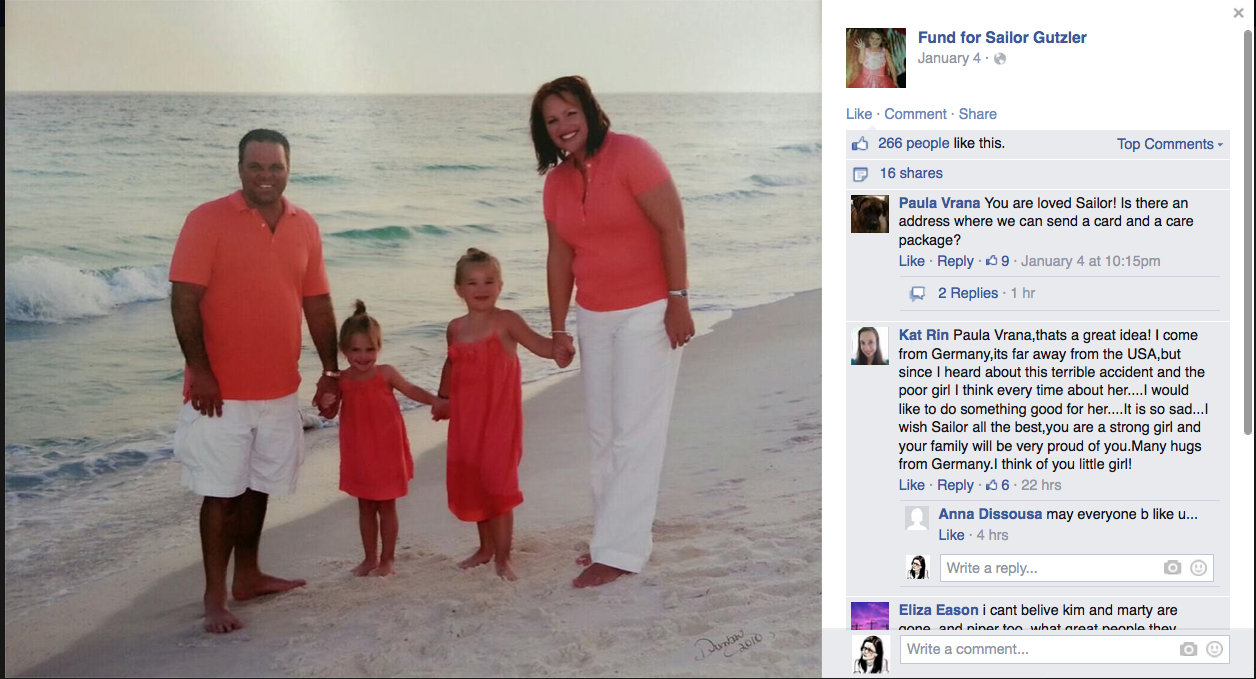
No one can believe the bravery and pluck of 7-year-old Sailor Gutzler, the little girl who survived the crash of the small Piper PA-34 plane that killed her parents, sister and cousin, and then scrambled her way through the deep, dark woods to a stranger’s house for help on Dec. 2.
With a broken wrist. And no moon to guide her. And dressed for sunny Florida, but wandering through the chill of a Kentucky winter’s eve.
Her injuries were minor and she was released from the hospital to relatives the next day, but her story is still making headlines.
An expert on one of the talk shows said that in times of extreme stress, adrenalin kicks in, enabling us to go way beyond our normal capacities. As if Sailor was somehow beyond herself in that moment. Superhuman.
Because no one can imagine a 7-year-old being just, plain competent.
Sure, what she did was fantastic. But maybe ALL our kids are capable of being smart and resourceful, if only we give them a chance.
The thing is: we don’t. Underestimating kids has become our national pastime. We think they need us to wait with them at the bus stop, to organize their social life, to solve all their problems. An article in Parenting told parents never to let two friends play together unsupervised, even if they’re old enough to stay home alone: “You want to make sure that no one’s feelings get too hurt if there’s a squabble.”
That’s right. We’re told our kids can’t even handle a squabble without parental intervention.
With this kind of advice being shoved down our throats, I don’t blame parents for overprotecting. I do blame the fearmongering media for insisting that almost everything—a plastic bottle! a bad grade! a bike ride!—could somehow cripple our kids.
When, ironically, the ones really being crippled are the parents. Crippled with fear. Obviously, kids are more competent than we allow them to be: Until modern times, the parents were 13 year olds! They kept the species going! And to this day, says David Lancy, author of The Anthropology of Childhood, between 40 and 60% of the world’s toddlers are cared for by their older siblings, who may be just a year or two older than they are. We forget this when we worry that our kids need mom to pick up her 8 year old from the playdate a few blocks away.
There’s only one way I’ve found to fight that fear, and that’s with reality. In fact—promo alert— I’m about to host a reality show, World’s Worst Mom, starting Thursday night, Jan. 22, on Discovery Life.
Here’s what fear looks like: One mom I visit follows her 10-year-old daughter not just into the public bathroom, but into the stall, to keep her safe. Another wants to put videocameras throughout the house so she can make sure her six kids, aged 0-13, don’t sneak outside to play, even in the yard.
These aren’t bad moms, just terrified. They have no idea how competent their kids really are, because they’ve never let them go.
So my job is simple. I take the kids away from them. The 10 year old? I sent her to the park across the street park with her 12-year-old brother—something they’d never been allowed to do.
The kids of the mom who didn’t want them to go outside? I sent the three tweens down their suburban block, beyond where mom could see. Then I kept her in the house, while they set up a lemonade stand.
When all these kids came home—happy, sweaty, thrilled to have finally had even the most modest of adventures—I thought maybe the moms would be mad. Instead, they were out of their minds…with joy.
They were so proud of their kids, one of them actually grabbed me in her arms and twirled me around.
Now, obviously, it takes a lot more to get yourself out of a plane wreck than to run a lemonade stand. But at base what we’re talking about is this: Our kids are way more competent than we think. We cheat them—and us—when we don’t let them prove it.
More Must-Reads From TIME
- The 100 Most Influential People of 2024
- The Revolution of Yulia Navalnaya
- 6 Compliments That Land Every Time
- What's the Deal With the Bitcoin Halving?
- If You're Dating Right Now , You're Brave: Column
- The AI That Could Heal a Divided Internet
- Fallout Is a Brilliant Model for the Future of Video Game Adaptations
- Want Weekly Recs on What to Watch, Read, and More? Sign Up for Worth Your Time
Contact us at letters@time.com